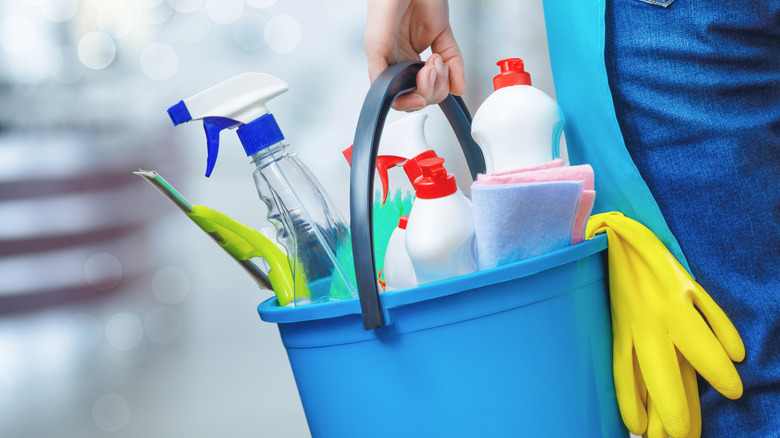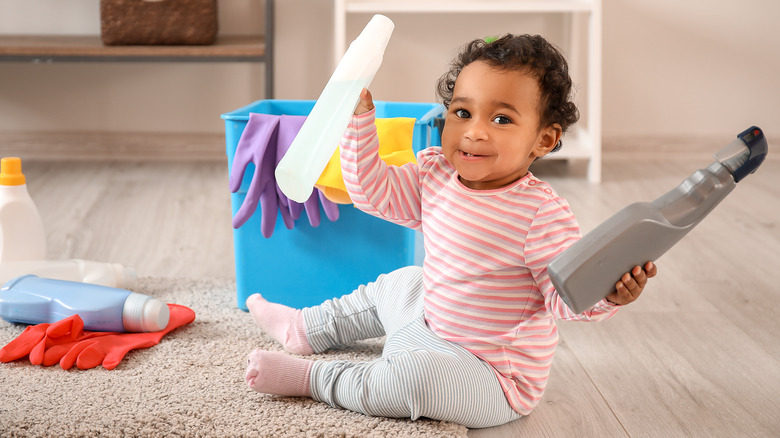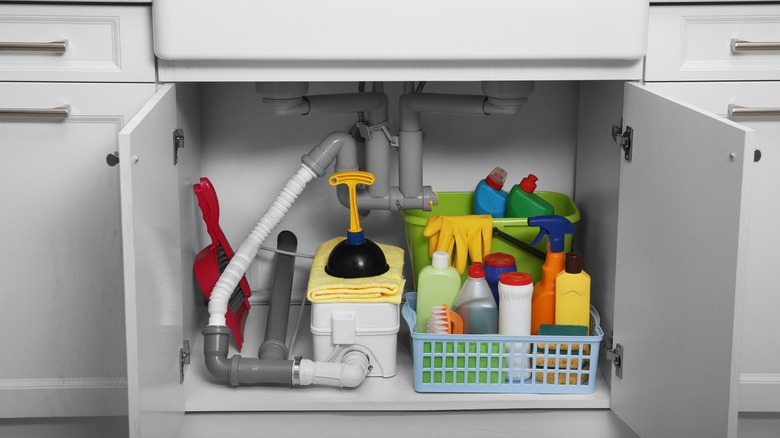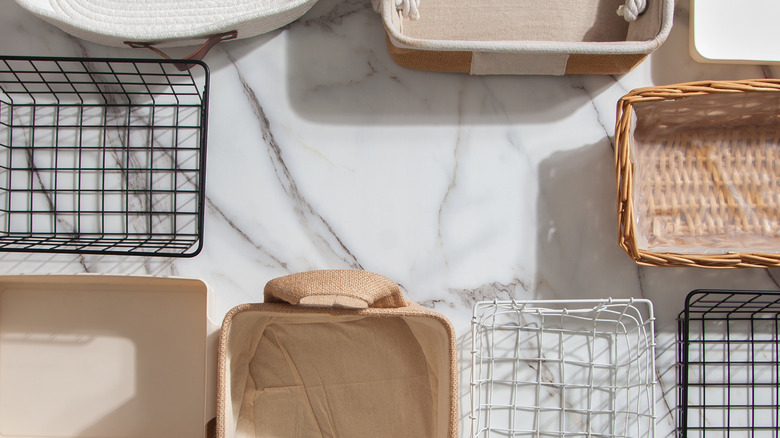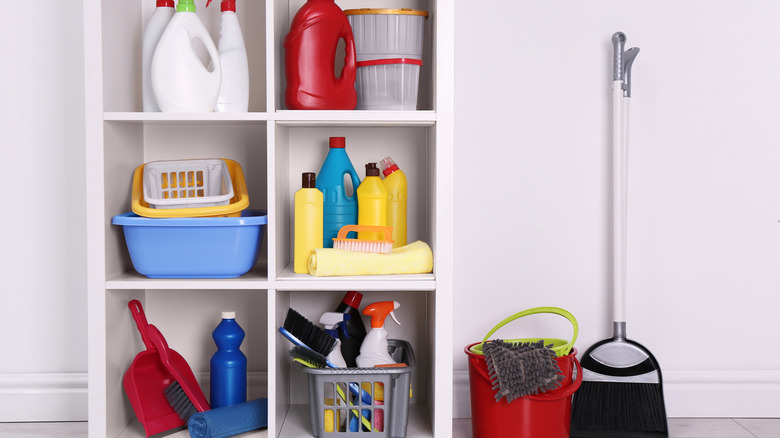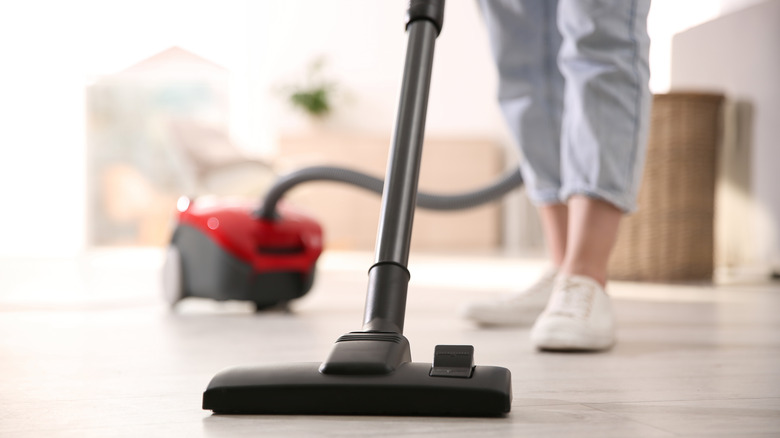You Might Be Storing Your Cleaning Products All Wrong
If you're in charge of taking care of the cleaning duties in your home, you know better than anyone how frustrating it can be to find enough space for your cleaning products and tools. Perhaps it takes you just as much time to gather the bottles as it does for you to carry out the task, or maybe you find that you've run into safety issues around where the more dangerous chemicals are stored. The good news is that there are many ways to organize and store your cleaning supplies, which will not only make it easier for you to complete your housekeeping chores but will minimize any cleaning-product-related accidents.
Did you know that just dumping your cleaning supplies in one random location in your house is not the way to go? Martha Stewart advises its readers to consider several key questions regarding cleaning product storage — such as the amount of storage space available in your home and whether you have pets or children — to determine the best way to organize your supplies. If you're ready to start storing your cleaning supplies the right way, take a peek at the following guide.
Never store cleaning products on the floor
This one is for all you parents and caretakers out there. If your storage solution for your chemical cleaning products has been the floor — even if it's on the floor of a pantry or other closed space — this is a big no-no, as per Martha Stewart. Children, especially young ones, are curious and explore anything within their reach, including the dangerous chemicals housed in those spray bottles. Another considerable risk with little ones is their tendency to explore with their mouths. RoSPA reports that every day, on average, 15 children under five accidentally ingest cleaning products and are admitted to the hospital as a result. Poisoning, especially when it comes to bleach products, can cause severe injury and even death.
RoSPA advises parents to secure all cleaning products in a locked cabinet, shed, or garage, which means no more leaving them out on the floor. As an extra precaution, make sure the cleaning products are stored in a raised container that is not in reach of the child in case you accidentally leave the space unlocked one day. You should also ensure that chemical products are not stored in the same place as food or medicine to avoid cross-contamination. As always, for the utmost protection, make sure babies and young children are constantly under direct supervision or are left in designated safe spaces, such as playpens or child-proofed rooms.
Store space-specific products in the same place
One of the best ways to save time on your housekeeping tasks is to make sure you group space-specific products in the same storage basket or container. Then keep them in the room or area you will use them the most, advises The Spruce. For example, the kitchen cabinet underneath the sink is a popular storage area for cleaning products, but many people make the mistake of storing all the products they use for the entire house in the kitchen. If your bathroom cleaners are currently kept under your kitchen sink, they are in the wrong place.
A great way to stay organized is to purchase separate plastic bins or baskets for various rooms in your house. Kitchen supplies such as dish soap, oven cleaner, rubber gloves, sponges, and more, can all stay under the kitchen sink. However, you'll want to place a separate basket with your bathroom products under the bathroom sink or in a nearby storage closet. If you live in a two (or more) story home, consider making up two separate containers of cleaning supplies to store on each floor to ensure you don't need to lug products up and down the stairs every time you clean. If you don't have a separate laundry room for your washer and dryer, consider building a shelf near the machines for your laundry products or investing in a small cabinet to place nearby.
Invest in organizational tools to maximize storage space
In addition to using storage baskets for organizing your cleaning supplies, there are many products on the market that can help you maximize your storage space. Merry Maids offers a couple of fantastic ideas that take cleaning product storage to the next level. One suggestion is to purchase a lazy Susan to place in the cabinet where you keep your cleaning supplies. The lazy Susan will allow you to store all your supplies in just one section of the cabinet, while its ability to spin will give you full access to each one.
Another creative way to store your cleaning products is in a shoe organizer that hangs on the back of a door. If you have a separate pantry, shed, or garage for storing your cleaning supplies, a vertical storage solution such as this one saves space and makes it easier to find the product you need without digging through a bunch of bottles. Merry Maids also recommends purchasing a tension rod to install inside a cupboard. You can hang spray bottles and other supplies from the rod, such as dustpans and brushes, freeing up space underneath to store other items.
The storage space should be kept dry at all times
According to Martha Stewart, it's incredibly important to store your cleaning supplies in a dry space free from moisture and extreme temperatures. When certain chemicals come into contact with humidity, this can trigger a dangerous reaction that releases toxic gases into the air of your home. The same goes for when these products are stored in overly hot areas or near appliances that let off heat.
Environmental Consultant Marilee Nelson gives Martha Stewart readers a tip on how to avoid this. She recommends that cleaning products be stored in a garage or area outside of the main living space. She adds, "While using these products, ensure the area is well ventilated by opening windows or using fans. Then, return the cleaner to storage in an air-tight container, so it doesn't continue polluting the air your family breathes." It is also important to not mix cleaning supplies or pour them into containers other than the ones they were purchased in. This can cause a dangerous chemical reaction and pollute the air in your home. Finally, keep the products sealed tight whenever they are not in use.
Properly organize larger cleaning tools
Now that you have a better idea of how to store your smaller cleaning supplies, you'll also need to make sure your bigger tools, such as your vacuum, broom, and mop, are correctly stored as well. As these are bulky items, it is not advised just to toss them into a cupboard without a plan. Merry Maids suggests grouping these larger items together into a single storage space, so you know exactly where they are at all times. You can install hooks on the walls of this space to hang the mops, brooms, and dustpans to keep them off the floor.
Properly storing a vacuum can be a bit trickier depending on its size, according to Dreame. Cordless and vertical vacuum cleaners without a canister typically come with a wall mount for easy storage. Larger canister vacuums can be placed underneath a shelving unit in a closet or a designated plastic bin containing all the accompanying parts and tubing. Hand vacuums are much easier to keep out of the way and can be given their own bin on a shelf or in a cupboard.
